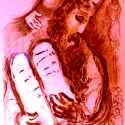|
R' Eliezer said that when justice is done on earth, heaven suspends judgment and does not exact punishment; but when there is no justice, heaven sits in judgment and sends down punishment... The world is in the perilous state it is today because it categorically disregards God's command to pursue justice and truth, especially for those who are downtrodden. Because of this, "justice is far from us, and righteousness does not overtake us; we hope for light, and behold, darkness, and for brightness, but we walk in gloom" (Isa. 59:9). The day of God's reckoning draws near (Psalm 2:2-12).
Our Torah portion this week (parashat Shoftim) includes the famous phrase "tzedek, tzedek tirdof" (צֶדֶק צֶדֶק תִּרְדּף): "Justice, Justice you shall pursue" (Deut. 16:20):
צֶדֶק צֶדֶק תִּרְדּף
לְמַעַן תִּחְיֶה וְיָרַשְׁתָּ אֶת־הָאָרֶץ
אֲשֶׁר־יְהוָה אֱלהֶיךָ נתֵן לָךְ
tze'·dek tze'·dek teer·dof
le·ma'·an tee·che·yeh ve·ya·rash'·ta et-ha·a'·retz
a·sher Adonai E·lo·hey'·kha noh·ten lakh

"Justice, justice shall you pursue,
that you may thrive and occupy the land
that the LORD your God is giving you."
(Deut. 16:20)
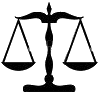
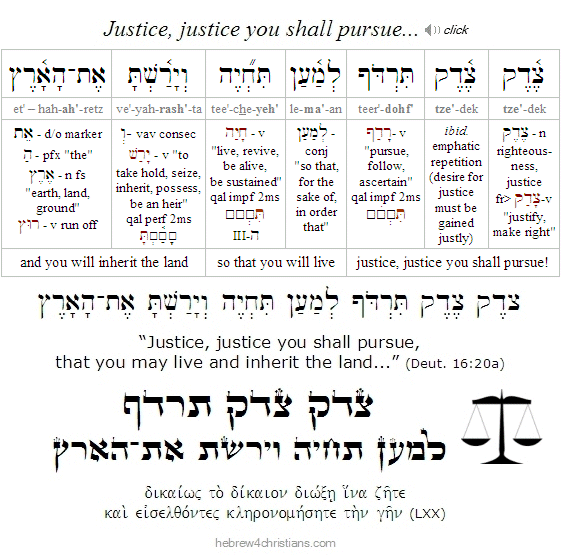
The Hebrew word tzedek means "righteousness" or "justice" and is one of the attributes of the LORD God of Israel. God is called the LORD our Righteousness (יהוה צִדְקֵנוּ), the Righteous God (אֱלהִים צַדִּיק), the Righteous Judge (שׁוֹפֵט צַדִּיק), and so on. God's righteousness implies that we who are created in His image have a duty to exercise righteousness in our daily lives. An act of tzedakah (charity) is therefore regarded as an moral obligation rather than as gemilut chasadim (i.e., act of benevolence). The prophet Isaiah wrote (Isa. 32:17): "The work of righteousness (tzedakah) shall be peace" (וְהָיָה מַעֲשֵׂה הַצְּדָקָה שָׁלוֹם), and added that "the service of righteousness shall be quietness and security forever (וַעֲבדַת הַצְּדָקָה הַשְׁקֵט וָבֶטַח עַד־עוֹלָם).
וְהָיָה מַעֲשֵׂה הַצְּדָקָה שָׁלוֹם
וַעֲבדַת הַצְּדָקָה הַשְׁקֵט
וָבֶטַח עַד־עוֹלָם
ve·ha·yah · ma·a·seh · ha·tze·da·kah · sha·lom
va·a·vo·dat · ha·tze·da·kah · hash·ket
va·ve·tach · ad · o·lam

"And the work of righteousness One shall be peace;
and the service of righteousness One shall be quietness
and assurance for ever."
(Isa. 32:17)
The exercise of justice inevitably involves judging ourselves and others. This is because the concept of "justice" or "righteousness" implies that we can discern what is morally true and therefore requires that we make judgments relative to that standard. However, all judgment must be tempered with grace and love.
חַנּוּן יהוה וְצַדִּיק וֵאלהֵינוּ מְרַחֵם
cha·noon Adonai ve·tza·deek vei·lo·hey'·noo me·ra·chem

"Gracious is the LORD, and righteous;
our God is merciful." (Psalm 116:5)

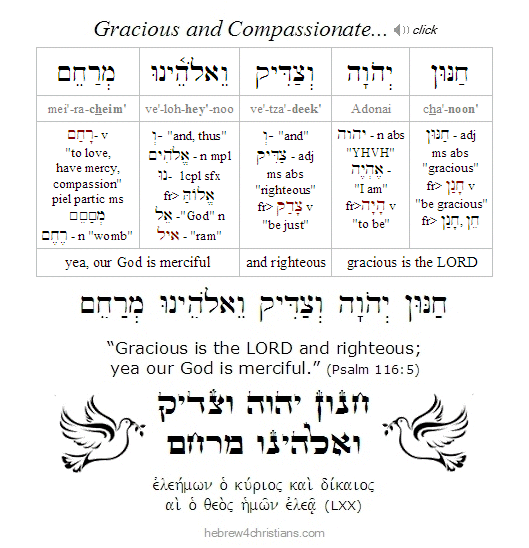
The Talmud states that when we judge mercifully and in accord with the truth, the Divine Presence joins us, but if we act corruptly, we "push" the Presence away and create a sense of exile. Yeshua told us to "whatever you wish that others would do to you, do also to them, for this is the Law and the Prophets" (Matt. 7:12). As we judge others, so we are judged ourselves. Looking at others from a selfish perspective is therefore a form of "bribery" that blinds us to the truth about righteousness (see Deut. 16:19).
Tzedek, tzedek tirdof also means that justice must be pursued in a just manner. The methods used to obtain justice must themselves be just. The Scriptures therefore do not advocate pragmatism or utilitarian thinking. There are no "noble lies" in the Kingdom of Heaven. Violence (verbal or physical) or deception done in the name of God is always a bad idea. We must execute great restraint and caution when we confront oppression in the world. If you want to change the world around you, begin with yourself....
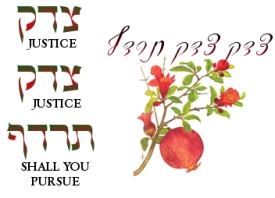 |
The God of Faithfulness and Truth (אלהֵי אָמֵן) never calls his followers to use unethical or evil means to effect righteousness. That includes issues of social justice, of course, but it also includes matters of religious "ministry." Preachers and religious teachers who lie, sensationalize, or stretch the truth "for the sake reaching the lost" are lying to themselves and therefore to God. As it says in Romans 12:21, "Do not be conquered by evil, but conquer evil with good," which means God makes the way for our victories in every circumstance if we call upon His Name for divine power and sanction...
μὴ νικῶ ὑπὸ τοῦ κακοῦ ἀλλὰ
νίκα ἐν τῷ ἀγαθῷ τὸ κακόν
God cares about our practice of righteousness and holds us accountable for our lives. Pirke Avot 5:8 states, "The sword comes into the world because of justice delayed and justice perverted, and because of those who misinterpret the Torah." God cares about the welfare of people. He is not mocked by the indifference or selfishness of others and brings judgment upon those who refuse to practice righteousness. "As it was in the days of Noah..." (Matt. 24:38-9; Luke 17:28-30). A Midrash (Genesis Rabbah) says that in Noah's day a person would walk into the market with a basket full of beans and leave with none. Each passerby would take just a few, knowing that the owner couldn't prosecute for such a small amount. It was not the "big sins" committed against heaven that brought down God's wrath (as it was later in the destruction of the Tower of Babel), but in the seemingly trivial lawless acts committed bein Adam L'chavero ("between man and his fellow man"). In Tractate Sanhedrin (108) it is written, "during the era of the flood, they transgressed every sin in the world but their fate was not sealed until they stretched out their hands in thievery."
Practicing righteousness is NOT optional for the follower of Yeshua, the King of Righteousness (מֶלֶךְ הַצְּדָקָה). Tzedek, tzedek tirdof (צֶדֶק צֶדֶק תִּרְדּף), "justice, justice, you shall pursue," is a message for Christians. "If you know that He is righteous, you may be sure that everyone who practices righteousness (πᾶς ὁ ποιῶν τὴν δικαιοσύνην) has been born of him" (1 John 2:29). "Doing" and "being" are united in the Hebraic mindset...There is no "being" righteous apart from the fruits of righteousness. As Yeshua said, "You shall know them by their fruits..."
You cannot have the Cross without the Torah,
and you cannot have the Torah without the Cross... God is One.
Note: While we are not justified by "works of righteousness" (Titus 3:5-6), we nonetheless will evidence righteousness as a result of the miracle of regeneration. Indeed, faith in the efficacy of the cross of Yeshua (i.e., God's salvation) implies acknowledging the righteousness of God... In other words, you cannot have the cross without the Torah, and you cannot have the Torah without the cross... Faith in God's righteousness transcends the weakness of the law (caused by human frailty, not by the character of the law itself) by imparting a new principle (or law) called the law of the Spirit of Life in Yeshua the Messiah (תּוֹרַת רוּחַ הַחַיִּים בְּיֵשׁוּעַ הַמָּשִׁיחַ): "For the law of the Spirit of life in the Messiah Yeshua has set you free from the law of sin and death" (Rom. 8:2). The "law of sin and death" (תּוֹרַת הַחֵטְא וְהַמָּוֶת) is the principle of the "flesh" that we remain subject to until we come to completely trust in the righteousness that only God gives us through Yeshua our Savior.... Then the miracle occurs.
"Then he showed me Joshua the high priest standing before the Angel of the LORD (מַלְאַךְ יְהוָה), and Satan standing at his right hand to accuse him. And the LORD said to Satan, "The LORD rebuke you, O Satan! The LORD who has chosen Jerusalem rebuke you! Is not this a brand plucked from the fire?"
Now Joshua was standing before the Angel, clothed with filthy garments. And the Angel said to those who were standing before him, "Remove the filthy garments from him." And to him he said, "Behold, I have taken your iniquity away from you, and I will clothe you with pure vestments." And I said, "Let them put a clean turban on his head." So they put a clean turban on his head and clothed him with garments.
And the Angel of the LORD (מַלְאַךְ יְהוָה) was standing by. And the Angel of the LORD solemnly assured Joshua, "Thus says the LORD of hosts (יְהוָה צְבָאוֹת): If you will walk in my ways and keep my charge, then you shall rule my house and have charge of my courts, and I will give you the right of access among those who are standing here. Hear now, O Joshua the high priest, you and your friends who sit before you, for they are men who are a sign: behold, I will bring my servant the Branch (צֶמַח). For behold, on the stone (הָאֶבֶן) that I have set before Joshua, on a single stone with seven eyes, I will engrave its inscription, declares the LORD of hosts, and I will remove the iniquity of this land in a single day." (Zech 3:1-9)
Notice the order of this amazing vision. First Joshua (Yehoshua ben Yehotzadak) was cleansed from his iniquity and clothed in God's righteousness, and then he was commanded to walk in the LORD's ways and to keep God's charge. This undoubtedly prefigured the grace of Tzemach Tzaddik (צֶמַח צַדִּיק), the Righteous Branch to come, who would likewise take away our sin and clothe us with God's righteousness. We are given the Holy Spirit to enable us to respond to God's love and to obey Him as dear children (Eph. 5:1-2). The LORD is the same yesterday, today, and forever, and He calls each of us to walk in holiness before Him (Lev. 20:7; 1 Pet. 1:15-16).
Our Torah reading adds, "You must be wholehearted with the LORD your God" (תָּמִים תִּהְיֶה עִם יְהוָה אֱלהֶיךָ) (Deut. 18:13). Notice the little word "with" in this verse (עִם). This verse hearkens to Micah 6:8: "What does the LORD require of you but to do justice (mishpat), and to love kindness (chesed), and to walk humbly (hatznea lechet) with your God?" Having a humble heart walks with the LORD. The word translated "humbly" comes from the same root that gives us the word tzeniut (צְנִיעוּת), meaning modesty or humility. Humility begins with the awareness that 1) there is a God and 2) you are not Him.... It is the practice of "knowing before whom you stand" and living your life in light of this basic truth.
A.W. Tozer wrote: "The humble man will attain a place of soul rest. As he walks on in humility he will be happy to let God defend him. The old struggle to defend himself is over. He has found the peace which humility brings." May it please the LORD to give us all hearts of genuine humility.
|


